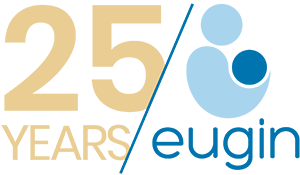Egg donation treatment is the assisted reproductive technology with the highest chances of success
Not only are a woman’s eggs fascinating, complex cells, but they are also extremely delicate and sensitive to the passage of time. Over time, the eggs naturally lose their reproductive capacity in an irreversible process that usually intensifies from the age of 35.
Several years ago this biological fact represented the end of the road to motherhood. However today, breakthroughs in assisted reproductive technology and the solidarity of many anonymous women allow other women to keep their dream of being mothers alive.
EUGIN Clinic does everything possible to use the woman’s own eggs. However, if this is not possible or not recommended, we can achieve the desired pregnancy through the help of another woman.
In vitro fertilisation with a donor’s eggs is a technique that is usually recommended for women over the age of 43. At this age, the likelihood of a woman managing to get pregnant with her own eggs is quite low and in addition –due mainly to the lower quality of these eggs– the risks of a miscarriage or problems for the foetus are increased.
This technique is also recommended in other cases –regardless of the woman’s age– in the presence of a genetic disease, a chromosome anomaly or a pathology that makes ovarian stimulation impossible. Six out of every ten women succeed in getting pregnant thanks to this assisted reproductive technique
Donor and receiver: a treatment specially adapted to each woman
The egg-receiving phase consists of two phases, which can be carried out in parallel or be programmed. The first phase is treatment for the woman receiving the eggs to prepare the lining of the uterus and the second is the stimulation of the ovaries and obtaining of eggs from the donor.
Today, thanks to the development of frozen egg technology, a woman can receive eggs that have been recovered directly from a donor or eggs that have previously been recovered and frozen. In both cases, the chances of getting pregnant are similar and considerably high.
Eugin Clinic offers both these treatment options. They allow greater flexibility and can be adapted to the needs of the women receiving the eggs and the availability of the donors. The woman receiving the egg can decide on the treatment method that best suits her needs. In other words, due to their labour or personal circumstances, some women may need to plan a visit to the clinic well in advance. In such cases, frozen eggs, among others, are the best solution. To ensure that the resemblance of the future child and his/her family are similar as possible, the donor will have the same physical features: race, height, skin tone, hair colour and eye colour as the woman receiving her eggs.
A simple treatment
The future mother visits the clinic to arrange a first appointment with the doctor and evaluate the most suitable type of treatment. After taking the decision, she can start the treatment at home.
The second visit takes place between two weeks and 45 days after the treatment has commenced. On this occasion the embryo or embryos are transferred to the woman’s uterus. In the event of implantation, the pregnancy will follow its course just like any natural gestation process.





